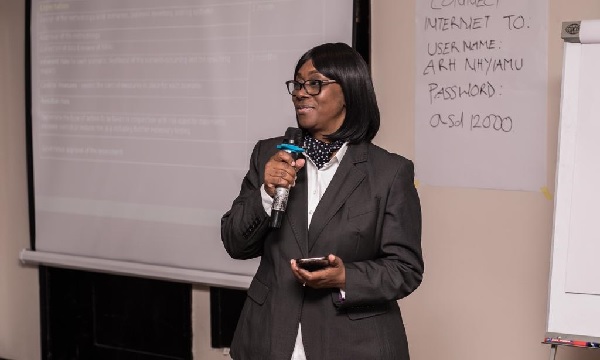
Ghana International Bank (GHIB) has facilitated an Enterprise-Wide Risk Assessment (EWRA) training programme for over 50 bankers across Ghana, Gambia and Sierra Leone.
EWRA is a comprehensive statement for financial crime risk management at an enterprise level with the purpose of helping you identify, assess and analyse key business risks—and minimise negative business impacts if those risks come to pass.
The three-day workshop organised in Accra aimed to deepen banks’ knowledge of EWRA from a financial crime perspective.
It also formed part of GHIB’s comprehensive plan to work closely with banks in the African sub-region to implement robust financial crime risk management systems.
The Chief Banking Officer of GHIB, Ophelia Atttobrah, explained to the media that the bank had observed that Enterprise Risk Assessment (ERA) was a key deficiency for many of the banks, hence the training.
In line with our vision to be the most compelling UK bank that focuses on Africa, we deemed it important to take the initiative to support some of these banks in upskilling in the EWRA area.
This training aims to give them the necessary skills to understand how best to assess the enterprise, including products, customers, operational regions, policies and procedures, ensuring that they meet global or international financial crime anti-money laundering regulatory standards”.
Managing risks
The Country Representative, Ghana, and Head of Client Coverage, Africa, Baafuor Ohene Abankwa, added that the programme would enable banks to put in place the right measures to manage risks and safeguard revenues.
“In today’s banking world, banks need to properly assess the risks they face to ensure they do not lose revenues.
This training will equip them to assess risks from a financial crime-based point of view.
Once that is done properly, banks will be confident that revenues will not be lost due to the crystallisation of certain kinds of risks.
We hope that the banks will be able to examine everything, assess the risks they face thoroughly, and implement proper measures to manage them effectively, preventing the risks from materialising and causing financial losses,” he said.
The Director of Financial Stability Department at the Bank of Ghana, Dr Joseph France, said the programme was timely because it played a crucial role in correspondent banking in cross-border transactions.
The need to understand the EWRA methodology and apply it appropriately to comply with the requirements of correspondent banking cannot be over-emphasised, given the crucial role of correspondent banking in cross-border transactions and the need to prepare adequately for the third round of mutual evaluation,” he said.
He expressed the hope that participants will leverage the opportunity to equip themselves with the required competencies in EWRA methodology to ensure utmost compliance with the requirements of correspondent banks.

